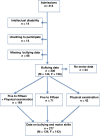Childhood clumsiness and peer victimization: a case-control study of psychiatric patients
- PMID: 23442984
- PMCID: PMC3602183
- DOI: 10.1186/1471-244X-13-68
Childhood clumsiness and peer victimization: a case-control study of psychiatric patients
Abstract
Background: Poor motor and social skills as well as peer victimization are commonly reported in both ADHD and autism spectrum disorder. Positive relationships between poor motor and poor social skills, and between poor social skills and peer victimization, are well documented, but the relationship between poor motor skills and peer victimization has not been studied in psychiatric populations.
Method: 277 patients (133 males, 144 females), mean age 31 years, investigated for ADHD or autism spectrum disorder in adulthood and with normal intelligence, were interviewed about childhood peer victimization and examined for gross motor skills. The parents completed a comprehensive questionnaire on childhood problems, the Five to Fifteen. The Five to Fifteen is a validated questionnaire with 181 statements that covers various symptoms in childhood across eight different domains, one of them targeting motor skills. Regression models were used to evaluate the relationship between motor skills and the risk and duration of peer victimization, adjusted for sex and diagnosis.
Results: Victims were described as more clumsy in childhood than their non-victimized counterparts. A significant independent association was found between reportedly poor childhood gross motor skills and peer victimization (adjusted odds ratio: 2.97 [95% confidence interval: 1.46-6.07], n = 235, p = 0.003). In adulthood, the victimized group performed worse on vertical jumps, a gross motor task, and were lonelier. Other factors that were expected to be associated with peer victimization were not found in this highly selected group.
Conclusion: Poor gross motor skills constitute a strong and independent risk factor for peer victimization in childhood, regardless of sex, childhood psychiatric care and diagnosis.
Figures



References
-
- Hunter SC, Boyle JM, Warden D. Perceptions and correlates of peer-victimization and bullying. Br J Educ Psychol. 2007;77(Pt 4):797–810. - PubMed
-
- Salmon G, West A. Physical and mental health issues related to bullying in school. Curr Opin Psychiatry. 2000;13:375–380. doi: 10.1097/00001504-200007000-00003. - DOI
Publication types
MeSH terms
LinkOut - more resources
Full Text Sources
Other Literature Sources
Medical

